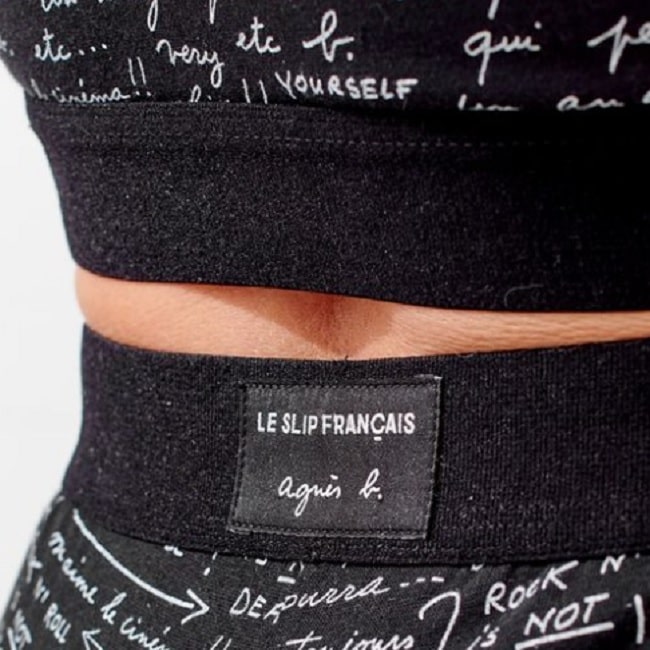Made in France: Shop for Quality Artisanal Products
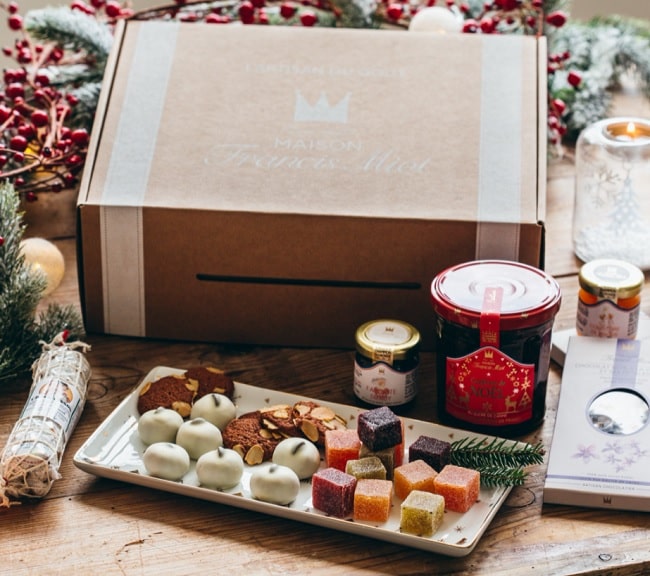
Once a bit of a trend, the Made in France ethos is in full force. It’s an art of living that French consumers are adhering to. They believe French-made products represent a guarantee of value and durability, and they’re willing to pay more for quality merchandise.
A little history of artisanal goods or why the cream rises to the top.
Industrialization in France happened at a much slower rate than in England, and the change to mass production lagged behind. Yet, small-scale industry in France was more secure than in other countries, because the demand for French luxury goods ensured the employment of highly skilled artisanal workers.
In the early days, skilled artisans producing French goods were part of an extensive social fraternity called compagnons. Compagnonnage dated back to the Middle Ages when apprentices, or compagnons, were extensively trained by masters in one of six areas: wood, stone, metal, copper, leather/ textiles, and the culinary trades. These artists in training made a tour de France, traveling the country to diversify their talents and gain new techniques. Never considered working class, these artisans were expected to open their own shops and ateliers upon their return.
During the Industrial Revolution, France’s towns grew at different rates and at different times. Industrialization left cities like Orleans and Dijon alone. Other towns like Saint-Etienne grew because of their facility in textile manufacture and metal work. Lyon’s success was guaranteed due to its reputation as a silk manufacturing center. But by the end of the 19th century, the majority of French craftspeople weren’t found in faceless factories or dark mills.
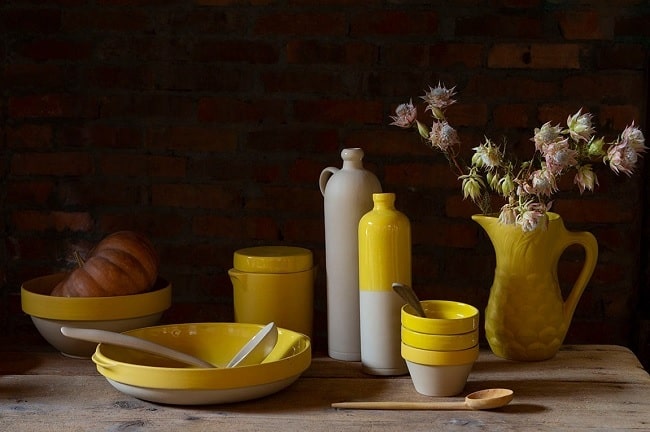
Stoneware pottery from Manufacture de Digoin. Courtesy of Digoin/ Facebook
Why is “Made in France” so important?
Made in France or Fabriqué en France is an actual merchandise mark, not a slogan. It’s a certification that governing bodies give to authentic products, once they have satisfied the criteria of French manufacture, product safety, respect for the environment, and the assurance of good working conditions. Labeling is taken very seriously. The product must be planned and packaged in France with a significant part of the manufacturing done within the country.
The Made in France campaign has much in common with the Entreprise du Patrimoine Vivant (EPV), a Living Heritage Company. Created in 2005, the EPV is an official French label given for a five-year term, under the authority of the Ministry of the Economy and Finance. It honors French companies with excellent artisanal and industrial expertise. After a rigorous selection process, it’s awarded to establishments who know how to merge innovation with traditional heritage.
Buying Made in France is largely an ethical choice. The global health crisis with incumbent snags in supply chains, puts everyone, including France, in the same boat. It’s a reminder to consume locally and responsibly.
Caring about details and quality is the French way. Buying French means you’re adding to that mindfulness. Focusing on quality instead of quantity, two thirds of the French are willing to pay a little more for a quality product. For the French it means buying from passionate craftspeople and manufacturers who have indisputable expertise. It means guaranteeing local employment and reducing one’s ecological footprint. This means of consumption enables a sustainable economy, when so many of us buy inexpensive, disposable imports.
Made in France means a lot more than Dijon mustard, Marseille soaps and Breton pullovers. The designation applies to perfumers and fashion designers, but also chocolatiers, ceramicists, and those specializing in the more esoteric. Here’s a selection of favorites.
Clothing and Fabrics
Besides the always-desirable, stripy pulls-marins by Saint James is the hip and sporty clothing company, Le Slip Français. For almost 10 years, Le Slip Français has worked with local textile savoir-faire. Consuming less and consuming better promotes an ethical and responsible economy. The company’s entire textile production chain is within France’s borders.

Courtesy of Saint James/ Facebook
Pyrenex clothing has been collecting down and feathers from the best farms around southwest France for more than 160 years and turning it into warm and cozy bedding, sleeping bags, and winter coats. Their unique expertise combined with quality control, and local employment ensures a product of the highest quality. Pyrenex is respectful of the feathered friends involved in their supply chain.
Filt 1860, a textile company based in Normandy, has been a manufacturer of all manners of nets and cords since 1860. It also makes baby carriers, hammocks and the best looking mesh bags for toting groceries. It’s the little things that mean a lot.
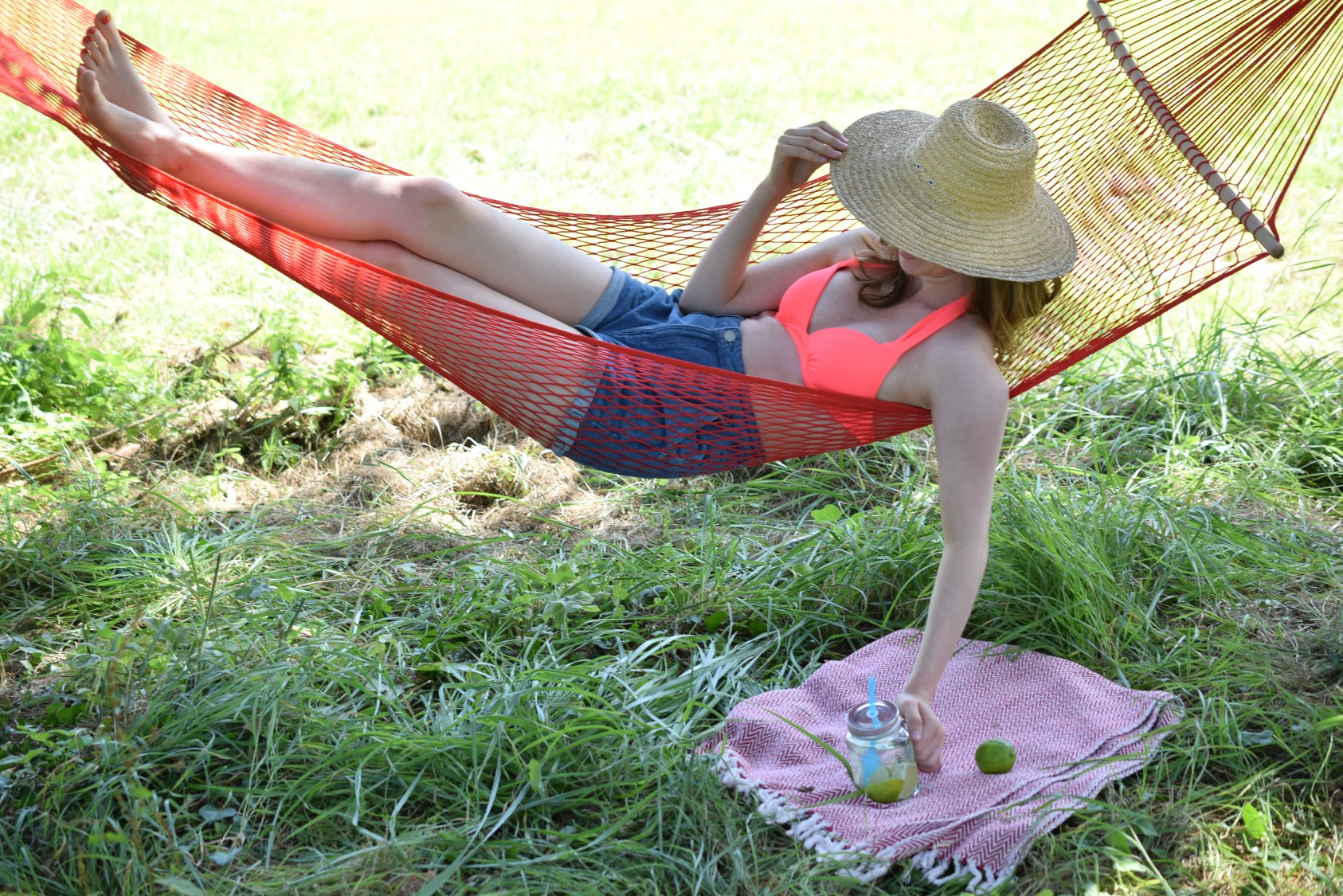
courtesy of Filt 1860/ Facebook
The Maison Coustillères is a family hat shop established at the beginning of the 20th century in a town once rife with hat makers. This Entreprise du Patrimoine Vivant relies on ancestral knowledge, and miraculously preserved tools and machines from another time. Since 1798, the town of Septfonds has been known for its hat production, when a local shepherdess first braided the straw littering her field. At one time the town boasted as many as 25 hat factories.

Courtesy of Vaincourt/ Facebook
But not all Made in France or EPVs have ancient roots. In 2011 the belt manufacturer Vaincourt Paris was imagined by female fashion entrepreneur who partnered with a talented leather-goods artisan. Originally based in the French Limousin region, today Vaincourt is managed by a Parisian team. Their products are expensive but will last a very long time.
Kitchen, Pots, and Gadgets
Since 1768, the family-owned Revol has developed their expertise in manufacturing culinary porcelain. Located in Saint-Uze, nine generations of the same family have run the company for over 250 years. Their quality clay results in a wide range of cookware and serving ware for the hospitality industry and home use.
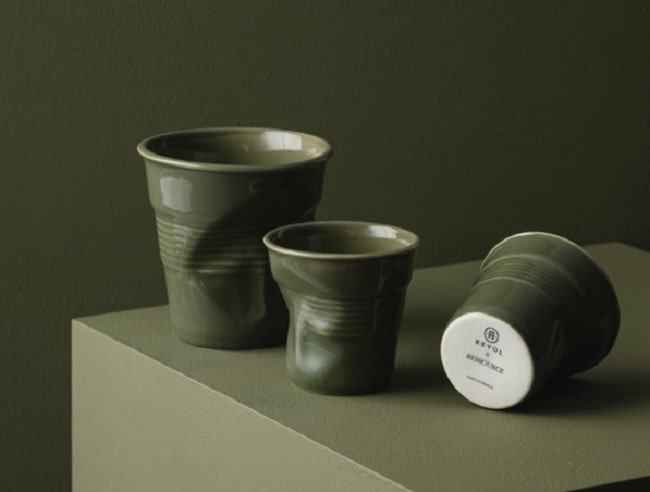
courtesy of Revol/ Facebook
Located in Burgundy, Le Manufacture de Digoin has passed down the tradition of hand-crafting stoneware pottery since 1875. The result is a beautiful array of pots in organic shapes and subtle colors. La Manufacture de Digoin holds the French Government’s Entreprise de Patrimoine Vivant seal. The clay, prepared inside Digoin’s workshops, is extracted from the earth surrounding Burgundy, Auvergne, Charente, and the Île-de-France regions.
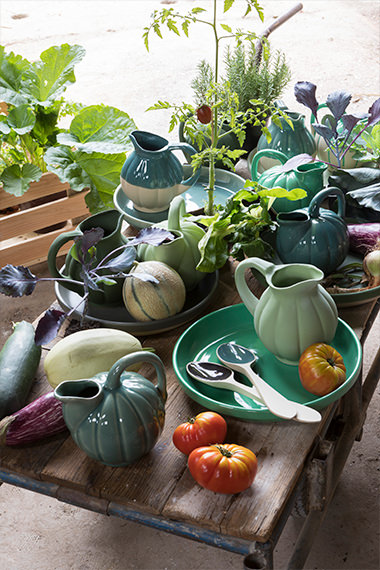
Courtesy of Digoin
For more than 70 years, Krampouz has been committed to promoting Breton culture and crepe making. In 1945, the new home of electrician Jean-Marie Bosser’s belle-soeur lacked the requisite fireplace to make crepes. She urged her brother-in-law to create a gas crepe maker. He dubbed his invention Krampouz, the Breton word for crepe. “Seeing as this thing has no past, it must have a future,” he declared. Krampouz is recognized as an EPV and committed to 100% French manufacturing,
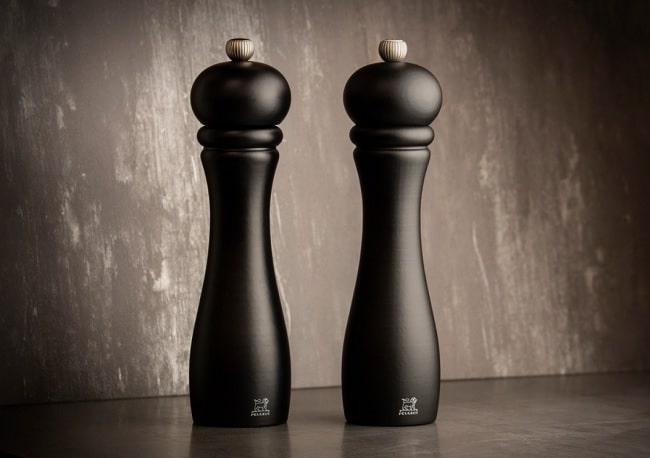
Salt and pepper shakers from Peugeot Saveurs
Existing long before the Peugeot automobile was the family steel foundry, transformed from the family mill in 1810. Under the name Peugeot Frères they made steel blades and watch springs and in 1840 they began the production of coffee grinders. Now they make not only cars and coffee grinders but also prestigious salt, spice and pepper mills.
Laguiole has been the manufacturer of a wide range of knives since 1829. The Laguiole forge making high-end artisanal French cutlery is located in a town of the same name in Aveyron. The Opinel knife has a reputation similar to that of the Laguiole. Invented by Joseph Opinel in 1890, the company has produced long-lasting, robust, and efficient knives for over 130 years. Based in Chambéry, Opinel makes pocket knives, small foldable garden tools, high-end table knives, and chef-quality knife sets. Esoteric and ever-so French innovations include knives for cutting mushrooms in the wild and those for opening chestnuts.
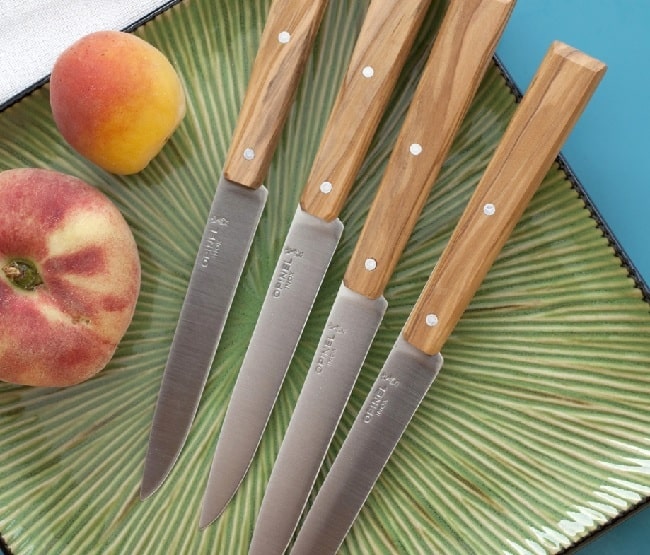
Kitchen knives. Courtesy of Opinel/ Facebook

Courtesy of Laguiole/ Facebook
Furniture
Ateliers Muquet, makers of cabinetry and luxury interiors since 1640, brings together 40 plus artisans highly specialized in the traditional skills taught through either the French compagnonnage mentorship system or at prestigious art schools. All apply their expertise on a daily basis and contribute actively to the company’s research and design projects.

Courtesy of Ateliers Muquet / Facebook
Lafuma Mobilier furniture stays true to the made in France ethos. Since their fist collection in 1954, the company, which makes unique outdoor furniture in the town of Anneyron, has stayed committed to hiring locally. Seventy-seven percent of their raw materials come from France with the remainder coming from Europe. With stretched tubes and taut fabric, this Living Heritage company is a little bit Bauhaus and a lot of French Chic.
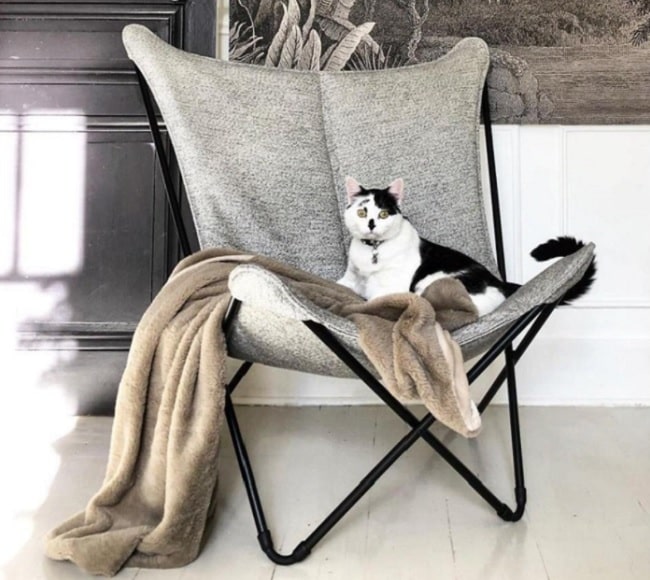
Courtesy of Lafuma mobilier/ Facebook
Treats
Original and innovative Le Criollo, an artisanal chocolaterie from Besançon, is an award winner, capturing the “Patrimoine Franc-comtois” prize at the International Food Show as part of the Regional Contest for Innovative Products.
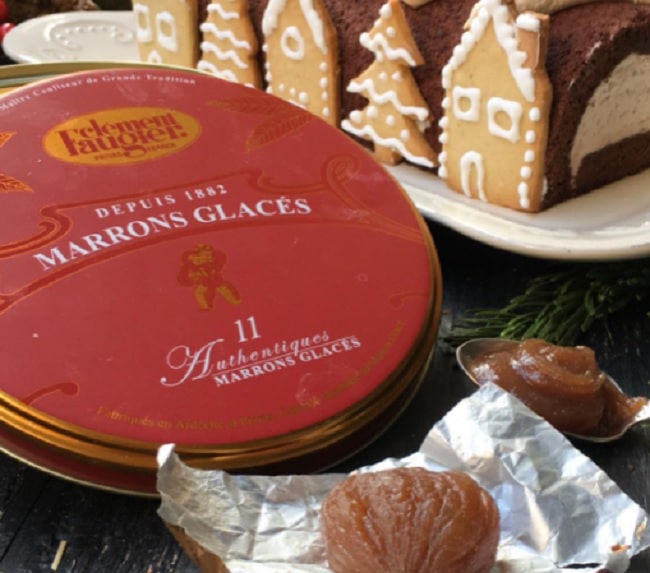
Courtesy of Clement Faugier/ Facebook
A personal favorite are the candied chestnut products from Clément Faugier. In 1882 when the local Ardèche economy was in crisis, young Clément Faugier created the first marron glacé factory in Privas. His skill was handed down to the Faugier children, particularly to Charles who became a master confectioner. The company merged with the Boiron family, the main supplier of chestnuts, and the company carries on the gastronomic tradition of chestnuts.
Nicknamed the Pope of Jam, Francis Miot has become the most famous jam maker in France. He learned the skill from his grandmother who gave him a taste for jam. He’s known for the number of titles and awards he has won, but also for his enthusiasm and his famous moustache. Maison Francis Miot also produces confectionary, chocolate and savory spreads at prices that don’t tax one’s wallet.
Esoterica
Falling into the “I didn’t know that existed” category is the Société des Ocres de France. Created in 1901, it’s the last company operating in Europe to transform mined ochre into pure pigment. This business, spanning four generations, is located in Gargas. They make and market hundreds of pigments for colored plaster, and lime wash; a line of fine art products including pastels; and safe pigments for homemade paint and cosmetics.
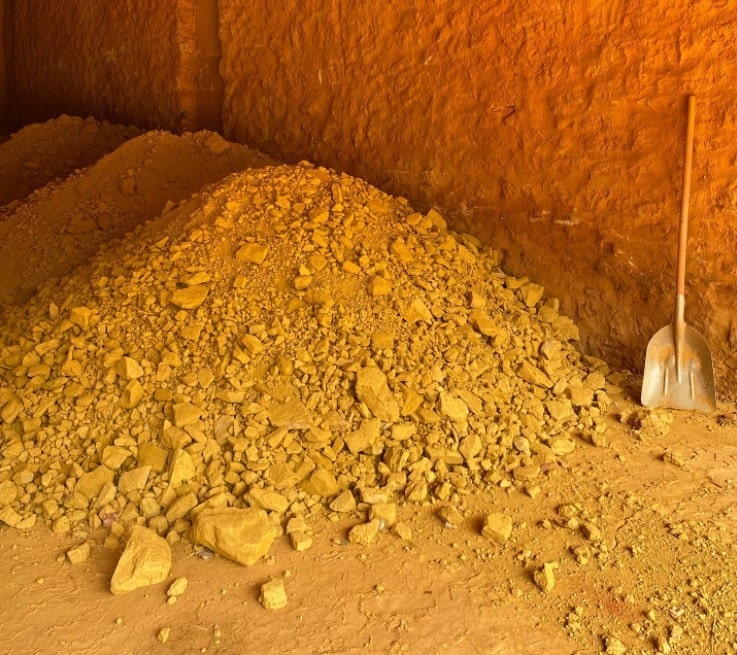
Pile of ochre. © Societe des Ocres, facebook
Making reeds for woodwind instruments is a complicated process demanding a great deal of precision, but the Marca Reeds company ensures the quality of the finished product. Located in Var, this EPV has been helping musicians since 1957.
Deyrolle, labeled a Living Heritage Company, is a quirky and wonderful cabinet of curiosities at 46 rue du Bac in Paris. It’s been a scientific and educational institution since 1831, specializing in the natural sciences and taxidermy. It’s an excellent reference source for information on flora and fauna.
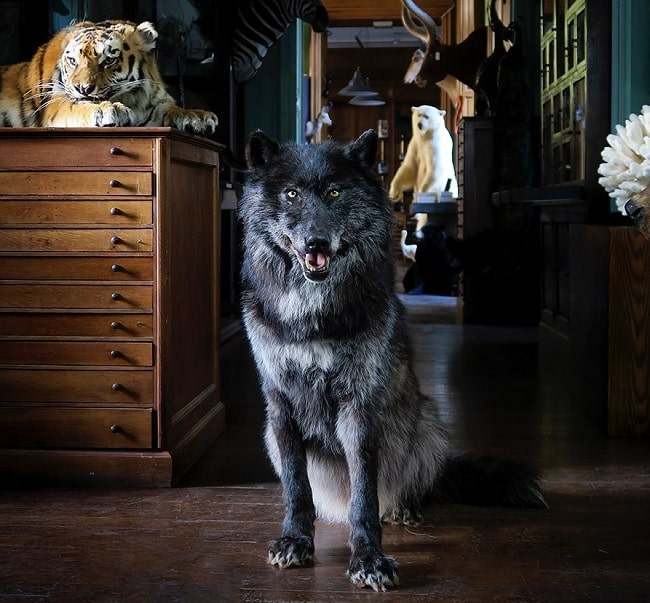
Taxidermy wolf. © Deyrolle, facebook
Good to know: The cream of French know-how is found every year at the MIF Expo, the “Made in France” show. Over 800 exhibitors offer thousands products made strictly in France. The MIF show is an annual November event at Paris’s Porte de Versailles for wholesalers and consumers.
Lead photo credit : Chocolate assortment from Maison Miot. © Maison Francis Miot/ Facebook
More in artisans, clothing, cooking, food, furniture
